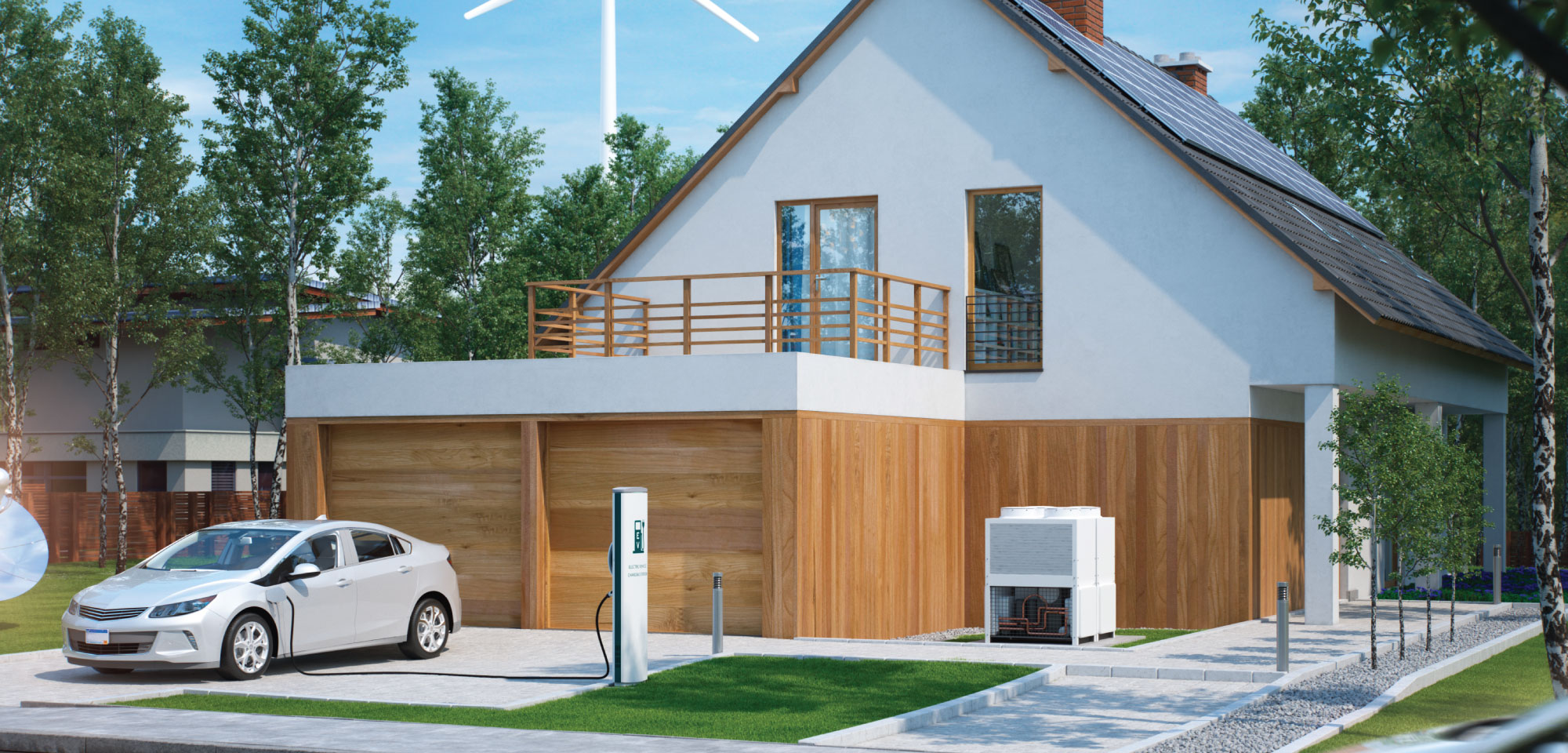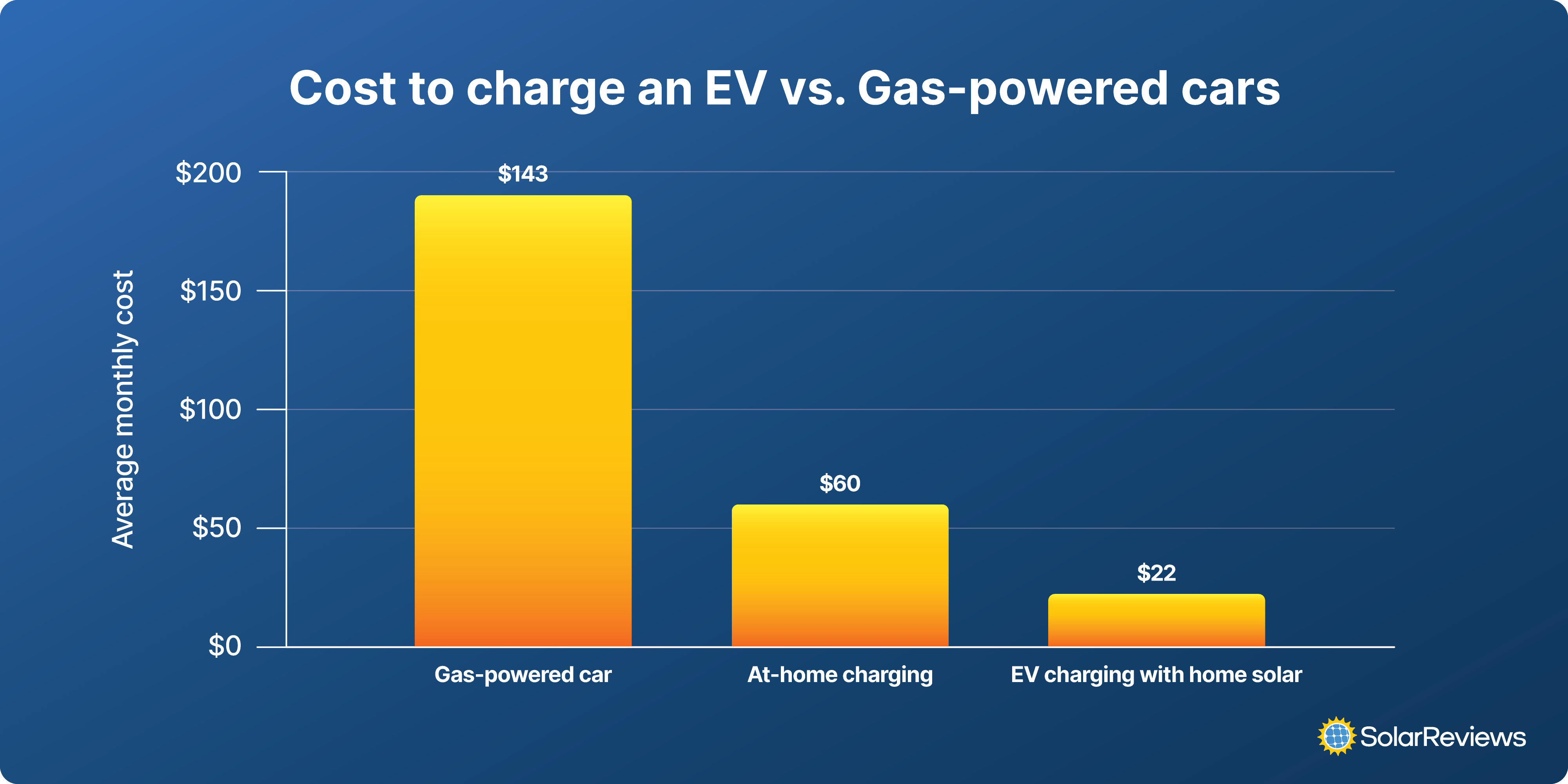Updated 1 year ago
How many solar panels do I need to charge an electric car in 2025?
Written by
Jamie Smith

How much can you save by charging your EV with solar?
Electric vehicles and solar panels are a perfect pairing. Both of these exciting technologies represent a major shift away from traditional means of transportation and energy. Together, they are sparking a revolution in self-reliance while helping lead to a more sustainable future.
The average electric vehicle will need the combined power of 6 solar panels to cover its monthly kWh consumption.
SolarReviews' latest EV report states that charging an EV with solar is the cheapest and cleanest option compared to gasoline costs, public EV chargers, and at-home EV chargers.
To calculate how many solar panels you need to charge an EV, you'll need to consider a few items: the kilowatt-hours (kWh) your car uses each day, the power output of your solar panels, and how much sunlight you get.
Let's plug in some numbers before you plug in your car.
Key takeaways
-
It will take the power of roughly 6 solar panels to charge the average electric vehicle.
-
Charging an EV with solar panels is the cheapest way to fuel a car, bringing in over $100 in monthly savings compared to a gas car.
-
To determine how many solar panels you need to charge your EV, you need to determine the kilowatt-hours (kWh) your car is using monthly, the output of your panels, and the peak sun hours where you live.
-
You can incorporate EV charging into your existing solar system, but you may need to add more solar panels to support the extra electricity consumption.
Why you should use solar panels to charge an electric car
Good for your wallet: Charging an EV with solar panels is the cheapest way to fuel your car. According to our research, it costs just $235 per year on average to charge an EV with home solar. That's over six times cheaper than fueling a gas car. Solar panels also shield you from rising electricity rates year over year.
Good for the environment: Using solar panels to fuel your electric car reduces your carbon footprint. EVs don't use gas, which already makes them environmentally friendly. But, charging with home solar panels guarantees that you're using clean, renewable energy to run your car instead of power from the grid, which may be derived from fossil fuels.
Good for your community: Generating solar power on your roof to charge an EV means that you can avoid taking power from the grid, especially when you have a solar battery. The less energy you take from the grid, the less stress you put on it, which helps prevent blackouts.
Calculating how many solar panels to charge an EV
The formula to calculate how many solar panels you need is (Monthly energy usage ➗Monthly peak sun hours) ➗Solar panel kW output.
According to the EV Database, the average EV uses 0.3 kWh per mile. The average driver travels about 1,207 miles per month, meaning the average EV uses about 362 kWh per month.
Divide that number by average monthly peak sun hours (5 hours per day or 150 per month), and you get a 2.4 kW solar panel system.
To determine how many panels you need, divide the solar system size in kW by the output of the solar panels you're using. Most solar panels today have a 400-watt power output or 0.4 kW. 2.4 divided by 0.4 gives you about six solar panels. Considering all the varying factors, it will most likely be between 5 and 8 solar panels.
Keep in mind that this is an estimate. The actual number of solar panels will vary depending on your car, where you live, and your chosen solar panel output.
How much will it cost to install solar panels to charge an EV?
It will cost about $7,200 to install 6 to 8 solar panels to cover the average cost of charging an electric vehicle based on the average cost of solar panels.
However, installing a solar panel system that covers all of your home's energy needs, not just your car charging, is more worthwhile! Then, you can save more money on your electricity bill instead of just covering the charging portion.
How much money can I save with solar car charging?

When you have a gas-powered car, your monthly fuel expenses will be an average of $143 per month. Charging your EV at home will net a monthly expense of about $60 per month, so you're already seeing savings of $83 per month just by switching to an EV.
You'll save even more once you start charging an EV with solar panels! The average monthly cost of charging an EV with solar power is about $21.72 based on the Levelized Cost of Energy (LCOE). That means charging an EV with solar is over $100 cheaper than fueling a gas car every month!
How do I charge my EV with solar panels?
You've determined how many solar panels you need to charge your EV – now what?
Now, you must buy the necessary solar equipment for home charging use. Sadly, you can't just plug six solar panels directly into your car. You'll need an entire solar panel system to power your vehicle.
The typical equipment includes:
Solar panels
Either a string inverter or microinverter to convert each of your panel's output to usable power.
A level 2 EV charger (or find an inverter with EV-charging capabilities built-in – like SolarEdge products)
Once the proper equipment is installed, you can begin charging your EV in the best and most cost-efficient way!
You can even use portable solar panels to charge solar generators that have EV charging capabilities. For example, the EcoFlow DELTA Pro is a hybrid portable/home battery that has EV charging attachments that can add some extra power to your car's battery in a pinch.
What if I have an existing solar system? If you’re a current solar owner and you’re thinking about adding an EV, you’ll need to get a level 2 EV charger installed. To integrate the charger with your system, you’ll need a 50-amp breaker added to your main panel. You may also need to expand your solar system to cover the additional kWh usage from your EV. We recommend consulting with your solar installer for guidance.
What are the other methods of EV charging?
You don't need solar panels to charge your EV, you can charge your vehicle at home or at a public charging station. The different types of EV chargers include:
Level 1 chargers: This type of charger provides power through a common residential 120-volt AC outlet. The lower voltage calls for slower charging speed, taking 40-50+ hours to get your EV to 80% from empty. This charger is for at-home use only.
Level 2 chargers: The most recommended charger for at-home use, this level offers higher-rate AC charging through 240-volt (primarily residential) electric service. These chargers can bring an EV battery to 80% from empty in about 4 to 10 hours!
Direct current (DC) fast charging: Also known as 'Level 3 fast charging', these chargers offer rapid charging along heavy-traffic corridors at installed stations. Fast charging equipment can charge an EV from 0% to 80% in just 20 minutes to 1 hour! DC fast charging is only available at public charging stations and is the most expensive method of EV charging. Tesla Superchargers are some of the most well-known DC fast chargers.
It is strongly suggested that you install a standard level 2 charger in your home when you buy an EV—relying entirely on public charging can be harmful to the long-term health of your car's battery.
Bottom line: Charging your EV with solar is the better option
Charging an electric vehicle with solar power is the cleanest and most cost-efficient way to charge an electric vehicle, but it also comes at a price.
Here are the facts: if you don't already have solar, you'll need to put out a couple thousand dollars upfront to get it installed or take the solar financing route. However, the savings accumulated on your electricity bills will help you see a return on your investment.
If you have an existing solar system – even better! Not only are you becoming less reliant on the electrical grid, but you are also doing your part in reducing that carbon footprint!
If you're unsure about solar for your specific home, put your information into our solar calculator to learn more.
Solar-powered EV: FAQs
Jamie is a content writer and researcher with a B.S. in Communications from La Salle University, where she focused on journalism, mass media, and public relations. As a former member of the SolarReviews editorial team, she created content to help homeowners better understand solar energy and make informed decisions. Prior to joining SolarReviews, she worked at a marketing company producing long-form stories and interviews that highlighted small ...
Learn more about Jamie Smith